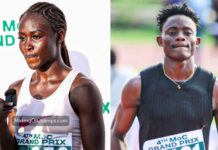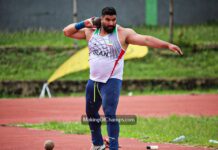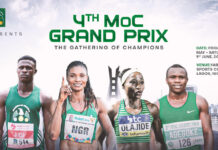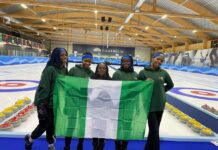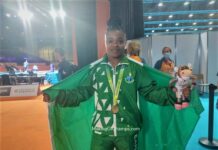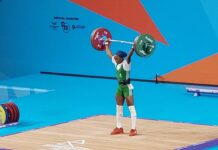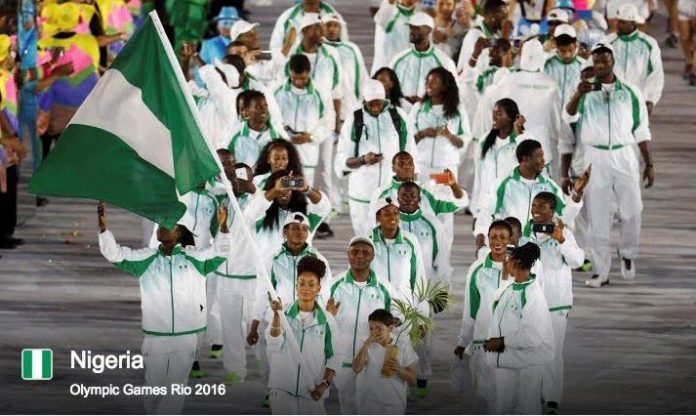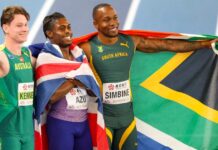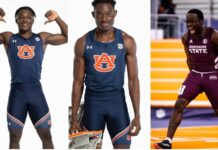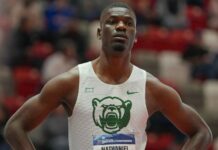Fans have been left disappointed about the Rio Olympics when at the end of Day 8 of Athletics, it dawned on everybody that for the second successive Games, Nigeria does not have a medal to show for participating in Track and field events.
There were signs and the cracks could be seen, but somehow there was little optimism the walls wouldn’t cave in and maybe could still hold on while the Games lasted. Alas it couldn’t hold for long and all came crashing.
It looked like something was going to be salvaged in Rio when the women’s 4x100m team comprising of Gloria Asumnu, Blessing Okagbare, Jennifer Madu & Agnes Osazuwa qualified for the final.
Factor in the theories that other countries could drop batons, lane violations & disqualifications, suddenly the hopes were emboldened. In fact when USA protested and qualified for the final, the rising hope dimmed, but still we believed hoping for a miracle.
Many stayed awake to watch the race to see how the team would fare, and when the 4x100m team finished 8th with a time of 43.23s, there was despair and anguish everywhere. The most dreaded moment had come and for the second consecutive Olympics Nigeria have no medal of any colour in Athletics.
How did we get to this level that a country boasting of manpower cannot produce a medallist eights year on from the London debacle?
In 2008, Blessing Okagbare won Bronze in Long Jump and the women’s 4x100m team of Franca Idoko, Halimat Ismaila, Gloria Kemasuode and Oludamola Osayomi initially won Bronze which was later upgraded to Silver, and since then we will give an arm and a leg just to win something.
Since Barcelona 1992, Nigeria have been ‘a Relay nation’, they somehow find a way to get on the podium, be it for Silver or Bronze in the 4x100m or 4x400m for each category respectively. Even, we got upgraded to GOLD in the men’s 4x400m team that competed at Sydney Games after USA got disqualified for fielding an athlete who doped.
Medals were won not just in the relays but individual events as well: from Mary Onyali to Falilat Ogunkoya and Chioma Ajunwa, we had Athletes who’s individual brilliance stood them out.
However that’s not the case anymore. With the exception of Ese Brume who finished 5th in the women’s Long Jump and the women’s 4x100m team, no other Nigerian athlete got to the final of the events they competed in at the Rio Olympics.
While South Africa boasts of a 400m World Record (WR) holder in Wayde Van Niekerk, and another potential one in Caster Semenya, Ivory Coast have joined them in that league of top Athletics nation.
Marie Josee Ta Lou narrowly lost winning Bronze to Shelly Ann Fraser-Pryce in women’s 100m because of a slower reaction time as she clocked the same time of 10.86s with the Jamaican. Ta Lou also made the women’s 200m final finishing 4th just behind Elaine Thompson, Dafne Schippers and Torie Bowie, not a bad cast to lose to. Isn’t it impressive that Ivory Coast are not relying solely on Murielle Ahoure?
Akani Simbine and Ben Youseff Meite ran in the men’s 100m final finishing 5th and 6th respectively. The last time a Nigerian man got to the final of the 100m was in 1996 when Davidson Ezinwa finished 6th with a time of 10.14s.
At the moment Nigeria can’t scratch out such a performance, getting to a major final now seems like getting water out of a rock.
It is heartbreaking for Nigerian fans that they would defy the odd hours, stay up late to watch their team, yet go to bed disappointed.
One would have thought that the horrors of London should have taught us valuable lessons on how to clean our house and get things in order. Four years later the house is dirtier and looks like taking many steps backward.
You watch and listen to the anthems of other countries, and it makes one green with envy. Kenya in this same continent with Nigeria, have won over five GOLD medals. You might say it’s in the long distance event, but which event are we even reputed for?
Dilshod Nazarov won Tajisktan’s first ever GOLD medal in the men’s Hammer Throw, Croatia two GOLD medals in women’s Discus and Javelin, countries we are way bigger than.
If we did not learn from that abysmal outing at London 2012, what is the assurance that Rio 2016 has taught us something? Unless something drastic is done, it could still be the same song playing by Tokyo 2020.
It’s been 20 years since Ajunwa did it, standing and watched as the Nigerian flag was hoisted. Nigerians long to hear “Arise, O Compatriots” bellowing from the PA system at an Olympic Games.
